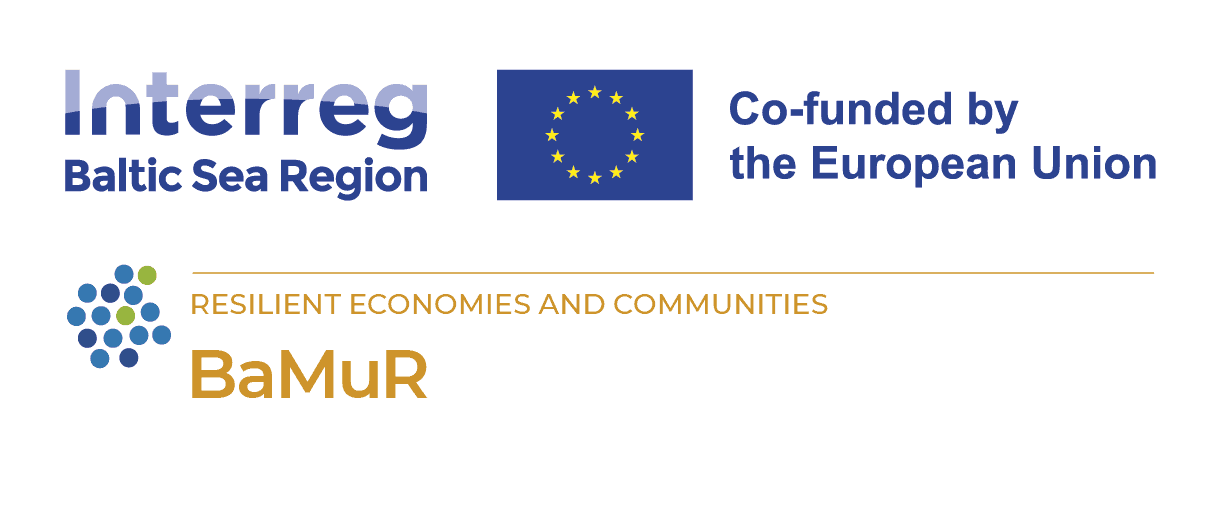
BaMuR
BaMuR
The resilience of societies and institutions in the Baltic Sea Region was significantly tested during the COVID pandemic and will face even a greater challenge at the time and after the war in Ukraine. During the last years it became apparent that in every country the museums, memory and cultural institutions have a much bigger role to play in ensuring resilience in the society during the crises than initially expected. The thirst for culture and entertainment (edutainment) was great: the number of e-exhibitions in galleries and museums increased, artists organised pop-up concerts from their home studios, online nonformal training courses fostered.
What was a problem?
The institutions were unprepared for the new situation and the solutions implemented were often ad hoc and lacked in terms of quality, means and methods (including technology) or chosen approaches. The content or focus of the solutions was often quite sporadic and did not sufficiently consider the local context, cooperation between the institutions was low and the involvement of the audience was often limited or not considered at all. Therefore, guidance on the proper solution was needed.
Tested solution
As part of the BaMuR project, we developed a toolbox that captures resilience from three different perspectives:
- Governance
- Digital sustainability
- Economic sustainability
Toolbox provides a set of examples and suggestions of what and how to do, following the abovementioned three strands.
Developed model provides means for societal and institutional resilience during a wide-spread crises but also serves as an integral part of the institutions core activities during periods of stability.
In addition, together with project partners, 3 of which were representatives of the museum and cultural institutions, sharing their experience and drawing on lessons learned after crises, the BaMuR project tested the created solution in 3 pilots.
The conducted pilots tested a number of elements of toolbox, contributing to the museums’ resilience:
- crowdsourcing - how the museum can involve volunteers in its scientific work, preparation of exhibitions and other daily activities
- virtual exhibition - how to design future digital content, by carefully adapting it to needs and expectations of each target group
- financing model - how museum can successfully arrange collaboration between partners from business, academia and museums around a common interest (“Mars-model”)
"To me the importance of the BaMuR project in strengthening the cultural sector has been crucial as it has developed and tested solutions that will be suited for each specific feature of cultural institutions" – Tanel Mätlik, Estonian War Museum – General Laidoner Museum
Why together?
Project partners from Estonia, Sweden, Finland, Lithuania and Poland collaborated to strengthen the resilience of museums, memory and cultural institutions. Transnational cooperation was needed for acquiring a broad range of approaches applied in different countries, considering intercultural differences, and reaching out to wider audiences in the Baltic Sea Region.
Budgets
in numbers.
-
0.48MillionTotal
-
0.39MillionErdf
-
0.00MillionNorway
Overview
- Participation, inclusion, and interaction (participatory governance)
- Organic connections and digital sustainability
- Financial/economic sustainability
BaMuR
in numbers.
Our solutions
-
Output
-
Output
-
Output
- 59.501409624.8344882
- 57.765464116.6428651
- 60.436936622.2344103
- 54.687045825.2829111
- 53.430181814.5509623
Project partners
- TownViimsi
- Region
- CountryEstonia
- RegionPõhja-Eesti
- RepresentativeEstonian War Museum - General Laidoner Museum
- Phone
- E-Mail
- Web
- TownVästervik
- Region
- CountrySweden
- RegionKalmar län
- RepresentativeMuseum of Västervik
- Phone
- E-Mail
- Web
- TownTurku
- Region
- CountryFinland
- RegionVarsinais-Suomi
- RepresentativeForum Marinum Foundation
- Phone
- E-Mail
- Web
- TownVilnius
- Region
- CountryLithuania
- RegionŠiaulių apskritis
- RepresentativePublic Institution National Regions Development Agency
- Phone
- E-Mail
- Web
- TownSzczecin
- Region
- CountryPoland
- RegionMiasto Szczecin
- RepresentativeBalteus Foundation
- Phone
- E-Mail
- Web
Contacts
-
Project manager, Financial manager, Communication managerTanel MätlikEstonian War Museum- General Laidoner Museum
Follow us
-
Social media
-
Additional links




